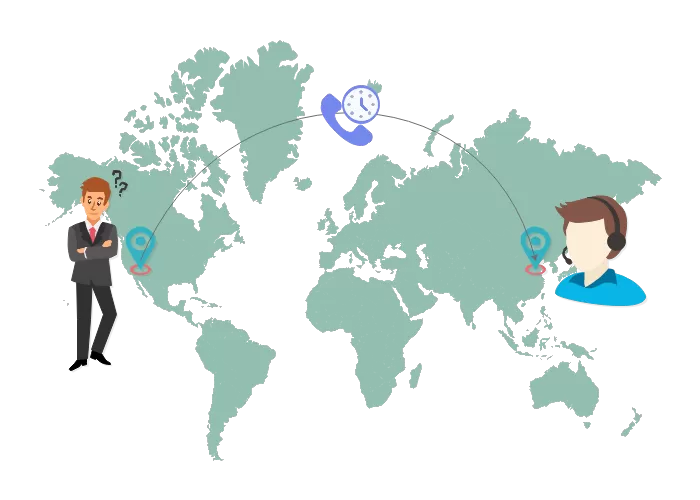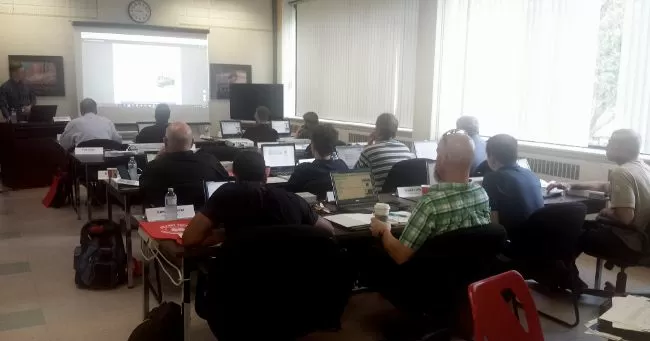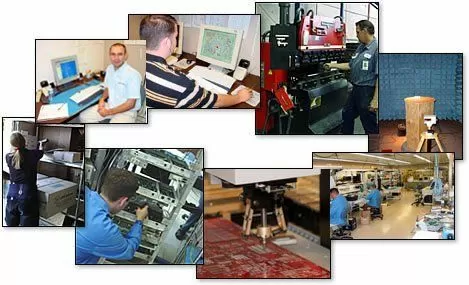Check out our White Paper Series!
A complete library of helpful advice and survival guides for every aspect of system monitoring and control.
1-800-693-0351
Have a specific question? Ask our team of expert engineers and get a specific answer!
Sign up for the next DPS Factory Training!

Whether you're new to our equipment or you've used it for years, DPS factory training is the best way to get more from your monitoring.
Reserve Your Seat TodayWhen choosing the company to buy your network monitoring equipment from, you'll want to make sure you're getting the most value possible for your money. Services provided after your purchase, such as tech support, can make all the difference in the long run.
However, good tech support is getting harder and harder to get.
Many companies outsource this particular service overseas. That's the product of a (short term) "sales focused" manufacturer. For them, not providing you with the best service you can get is acceptable, as long as they can save time and money.
On other hand, there are a few companies that provide excellent, personalized tech support that employ real people to answer your questions and to deliver personal support in a timely manner.
At the end of the day, maintaining an efficient remote monitoring system comes down to the level of tech support you are able to get from your provider.

We all know that when it comes to having a monitoring system, emergencies can happen - and you'll need tech support as soon as possible. The quicker you can get the problem fixed, the quicker you can make sure your network - and ultimately your revenue - is not at risk.
When a company outsources their tech support overseas, unless they have people working 24/7, you'll get a robotic and impersonal auto-reply, not the quick response you need.
Regardless of where you are, nobody wants to work with a company that's focused on speed over quality, and having your team deal with the logistics of an impossible time zone difference is no fun.
You may assume that English is the "international language of business," but that doesn't necessarily mean that your support technician - living in a completely different country - will know how to fluently communicate his ideas in this language.
Language barriers are a real problem, especially when dealing with many technical terms. The translation time will just add more time on an already lengthy response time.
Being able to help customers in their language of choice isn't just a nice gesture from a manufacturer - it could be greatly valuable to your bottom line. It also avoids unnecessary frustration and provides a proactive channel of communication. That's one big advantage of working with companies that have their tech support headquarters located here in the US.
It's especially frustrating when a tech support call feels like you're trying to communicate with people who have been trained to talk like machines - either because you're dealing with an untrained intern, maybe for perceived quality control, or even because they don't speak English well enough to go off-script.
Whatever the reason may be, many companies simply don't provide people with technical knowledge to solve your problems.
When deciding which company to go with, look for the few that do value their clients enough to put real engineers on the phone with you to help solve your problems. A qualified technical rep must know all the details of your system. They must have experience working with your equipment in the real world - designing, installing, setting it up, and ultimately doing the things you're trying to do. These people are what differentiates excellent tech support from the usual low-quality, poorly trained tech support.
Just imagine the situation: you need tech support right now, but you're waiting on hold. When you think you're finally able talk to somebody, you get to interact with an automated system - just to be put back on hold again.
Yes, you got yourself trapped in a tech support loop, also known as "voicemail hell".
At this point you're already losing your cool. You're calling for a reason, but now all you're doing is wasting your time. Plus, just as you expected, this company is aware of the torture you're going through. Their main goal is to make short-term profits only - at any costs. Even if it means forcing you into a terrible experience with their tech support.
To avoid all this, simply make sure - before your purchase - that you're dealing with a competent company that will always connect you to a live, qualified human being, who actually understands your gear and can solve your problem.
Don't think that organizations haven't studied how far they can take things in terms of providing the bare minimum. Some companies have even monetized it.
Several organizations are running a cost-per-contact model, which means they charge you every time you need tech support. This limits the time tech reps can be on the phone with you. If you happen to pay for the hour or minute, you might always be placed on hold or transferred from one person to another.
When it comes to methods to deliver support, one size doesn't fit all.
Your communication channel preference varies based on many factors. For example, you may feel like you can explain your problem better when you're talking to the tech rep on the phone. However, for some other people, just sending an email is easier and less time consuming.
It doesn't really matter which method you choose, your company should be prepared for it.
Sometimes, companies that outsource their tech support may only have one way to deliver this service, which, after all, is just another way for them to save on support costs.
How reliable is a network monitoring manufacturer that outsources their technical support? How long have they been in the market and for how long can you expect them to be?
These are important questions when considering which company you'll make business with. You don't want to try to contact the company you got your remote from, just to find out that they are not providing tech support anymore, or maybe are not even in the market any longer.
Some companies have established themselves more concretely than others, so you'll expect them to be around for many years ahead.
US companies will most likely be able to offer you some other services, such as training. Even if an overseas company does offer training, just think about the costs that you'd have to send your personnel abroad, let alone the price of training itself.
Seek companies that offer free, real-world training programs several times a year. These courses are taught by real engineers that helped design, build, and implement your equipment. During these classes, you should have the opportunity to work directly with the remote monitoring system in a safe environment.
Taking these kind of courses will allow you to know how to use your equipment easier, faster, and more efficiently. Ultimately, you won't need tech support as much.

In some ways your monitoring equipment is just a like a car. Every year, you want to make sure that the engine is still running smoothly like it's supposed to. This kind of routine maintenance can also be performed on your monitoring equipment.
Tune-up visits have many benefits. The money that you'll save in the long run by making sure that you're still using your gear at its best and by increasing your gear's life expectancy are just some of these benefits.
If you do decide to go with a company that has their tech support headquarters overseas, special services will most likely not be offered because it would be too costly for them to send technicians here to the US. Remember, they're outsourcing their services for a reason.
Companies rated best for tech support often charge more for their products, or they may charge a subscription fee for enhanced customer care so the cost of helping you is baked in.
This might look like a disadvantage initially, but the pros definitely outweigh the cons. It's time-consuming, and not efficient, to try to deal with poor-quality tech support.
Keep in mind that there are some companies that do have high-priced products for no reason. Avoid them at all costs.
Look for companies that, even though might charge a bit more initially, will give you the best value for your money. DPS, for example, offers you the best no-risk guarantees, free lifetime tech support, free factory training, tune-up visits, and much more.

Go with a company that recognizes and protects the investment you already made when you first bought your equipment. If you want to discuss more about how DPS can provide you the best vlaue for your money while also giving you a perfect-fit solution, I'm just a call - or email - away.

Andrew Erickson
Andrew Erickson is an Application Engineer at DPS Telecom, a manufacturer of semi-custom remote alarm monitoring systems based in Fresno, California. Andrew brings more than 19 years of experience building site monitoring solutions, developing intuitive user interfaces and documentation, and opt...